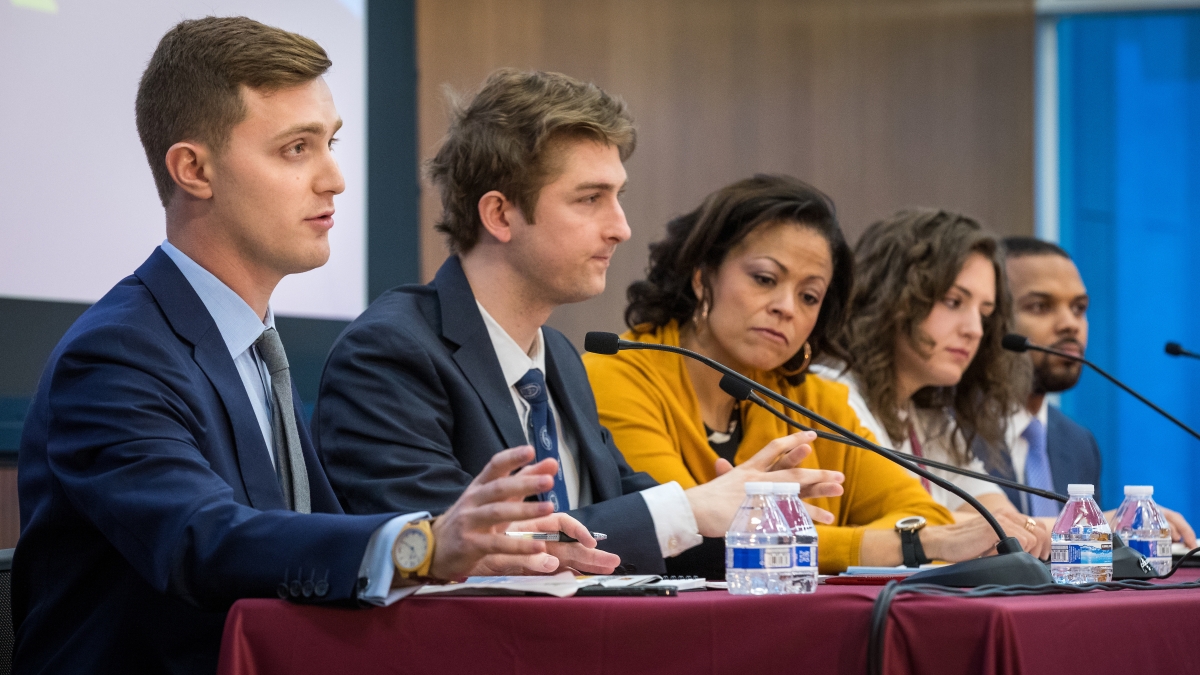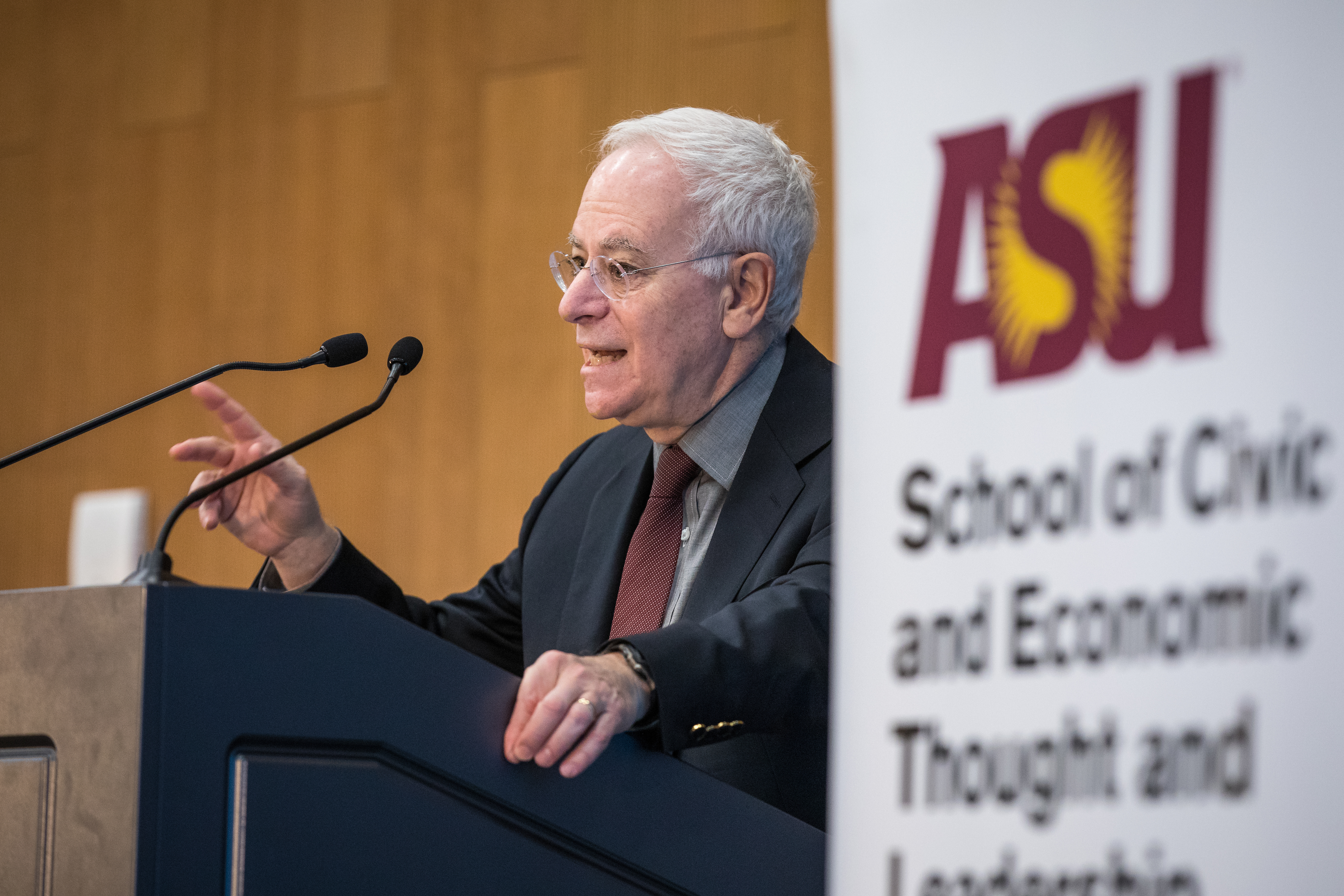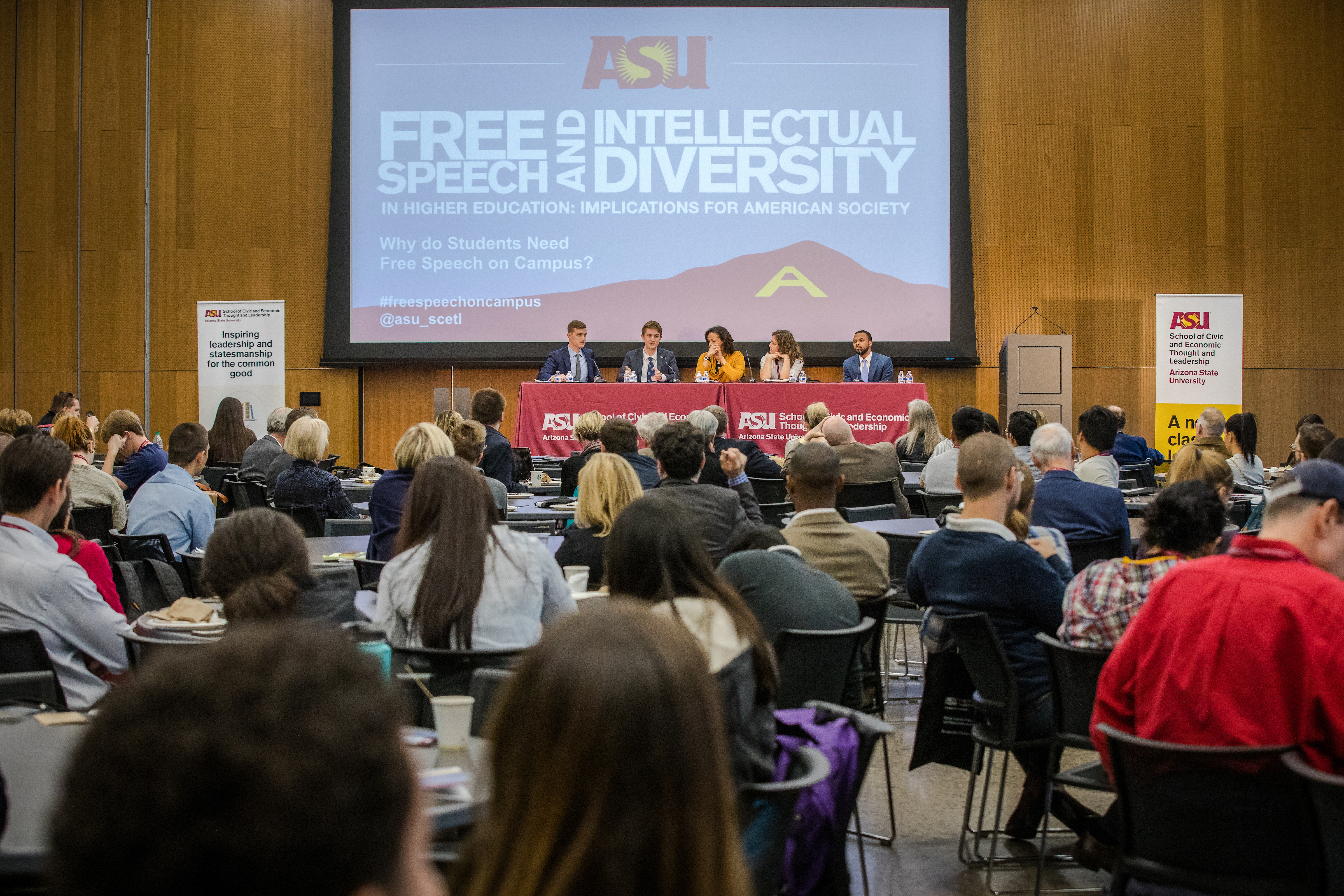Arizona State University's School of Civic and Economic Thought and Leadership held its inaugural spring conferenceThe conference was co-sponsored by ASU’s Sandra Day O'Connor College of Law and the Walter Cronkite School of Journalism and Mass Communication. Friday and Saturday on the Tempe campus. “Free Speech and Intellectual Diversity in Higher Education: Implications for American Society” welcomed students, faculty and experts from across the nation to discuss such topics as the meaning of the First Amendment on college campuses and free inquiry and intellectual diversity in higher education.
Robert Post, former dean of Yale Law School, opened Friday with a keynote address that looked at the classic interpretation of the First Amendment and what that means about how it should be interpreted on college campuses, where many feel free speech is currently under attack.
Post pointed out that within days of being confirmed, U.S. Secretary of Education Betsy Devos said that the real threat to modern universities is silencing the First Amendment rights of people with whom you disagree.
But, Post said, “if we’re going to assume the First Amendment applies on college campuses, we need to agree on what it protects” and what it doesn’t.
Robert Post, Yale Law School professor and former dean, delivers the keynote address at the inaugural conference of the School of Civic and Economic Thought and Leadership on Feb. 23 at the Student Pavilion on ASU's Tempe campus. Photo by Charlie Leight/ASU Now
Post laid out three basic rules that, in its most classical interpretation, ensure the First Amendment stands as a guardian to our democracy: 1) The state, in regulating speech, cannot engage in content or viewpoint discrimination. 2) All ideas are equal from the point of view of the government. 3) The state cannot compel you to speak or pledge allegiance to a particular government or candidate.
At a university, though, Post argued, people are not sovereign citizens; faculty, staff and students are all there to fulfill the function of the university, which is not to allow for airing of public opinion but to teach, to learn and to create knowledge. At universities, there is content discrimination — professors have to stick to whatever subject it is they’re there to teach, professors’ viewpoints have to be considered more valuable than students and individuals can be compelled to talk.
“So why are people talking about the First Amendment when they talk about free speech on college campuses?” Post asked. “What they have in mind are those aspects of the university in which its mission is most clouded,” such as when students invite an outside speaker — a sovereign citizen not beholden to the university’s mission — to speak on campus.
So how do we determine when and where free speech is applied on college campuses? It’s not black and white, Post said, but it is a discussion worth having, and schools such as SCETL are recognizing that and attempting to foster those kinds of discussions.
Students offer their perspective
Post’s keynote was followed by a student panel, which included remarks from ASU journalism students Gabriel Sandler and Tea Francesca Price on the question: Why do students need free speech on campus?
As a student at ASU’s Walter Cronkite School of Journalism and Mass Communication, Sandler covered much of the 2016 presidential election.
“It’s the responsibility of universities to promote and protect free speech,” Sandler said. “And ASU gave students the resources to elevate free speech in a time that really mattered both on and off campus.”
Price also praised the university, saying, “When you go to college, you’re going to be presented with perspectives that are very different from your own, so you need to learn effective communication. … It’s imperative to teach students that in college, if not earlier. ASU is the first place I’ve never felt limited to express myself freely.”
Matthew Foldi, a guest student speaker from the University of Chicago, shared an anecdote from his time with the school’s Students for Free Expression group to illustrate his opinion on the matter. He and others in the group, who held mostly conservative viewpoints, met with a member of the Black Lives Matter movement to learn more about the reasons behind his activism. What they discovered was they had more in common than they realized.
“The open exchange of ideas left everyone better off,” Foldi said.
Finally, Williams College student Zachary Wood talked about his role as president of the student group Uncomfortable Learning, whose mission it is to invite speakers with controversial views to campus.
“What we’re really trying to do is deepen our understanding of the world and humanity,” he said. “We can always gain something by thinking about perspectives that are unfamiliar to us.”
Around 200 people attended a student panel at the conference of the School of Civic and Economic Thought and Leadership on Feb. 23 at ASU's Tempe campus. Photo by Charlie Leight/ASU Now
Experts weigh in on opinion diversity
Following the student panel were two faculty expert panels, “Free Inquiry and the Philosophy of Higher Education,” moderated by Rhodes College Professor Daniel Cullen, and “Intellectual Diversity and Higher Education: A Crisis?” moderated by University of Texas at Austin Professor Cristine Legare.
Panelists discussed topics that included the value of diversity, euphemism and dissent in free speech.
Legare, in introducing her panel, said, “One thing that’s useful as a first step in my classes is to teach students how to have a debate.”
All panelists agreed to some degree that introducing students to a range of perspectives and guiding them on how to respond is essential to a true education. The crisis, some said, lies in the fact that you can’t have a range of perspectives if universities are made up of majority liberal professors, which they agreed seems to be the case.
Professors make up “one of the most liberal occupations in the U.S.,” said panelist and Colby College Professor Neil Gross. “About 60 percent identify as either liberal or far left. Only 13 percent identify as conservative or far right.”
The solution to that, fellow panelist and University of Notre Dame Law School Professor Rick Garnett posited, is for universities to accept their role as a crucial part of the infrastructure of public discourse, allowing many voices and viewpoints to have a place to be heard.
Surprising plenary address on heckling
Friday’s events ended with a plenary address from Jeremy Waldron of New York University, which focused on heckling at universities.
Waldron speculated that although some may claim heckling, often seen in the form of shouting down a speaker so as to stop them from being heard, is a direct assault on free speech, it may actually be an exercise of free speech itself.
“Heckling interferes with a persons’ ability to convey their message,” he said. “The provocative thing I’m going to propose is that that is sometimes a good thing.”
In fact, heckling used to be common, acceptable behavior at public speeches. Nowadays, we see hecklers being immediately removed from the audience. Waldron wondered, why is it not as tolerated nowadays?
Some would say it’s an issue of public order, that it disturbs the peace and presages disorder and the chance for violence. But, Waldron said, we need to distinguish between disorder and disruption.
He pointed out that, as with most things in life, there is a spectrum, with disconcerting questions from audience members at the less obstructive end and whole groups of people shouting over a speaker at the more obstructive end. Along the spectrum, there are of course shades of gray.
“Disturbing the composure of a speaker … is sometimes a good thing,” Waldron reiterated. “The speaker must take his audience as he finds them … [the speaker] is not entitled to exclude dissident choruses.
“Even though heckling is impolite and discourteous, it can nevertheless advance the values of free speech.”
More from SCETL
The conference continued Saturday at ASU’s Downtown Phoenix campus, with discussions such as “Negotiating Controversial Speakers on Campus,” “Freedom of Speech and Thought on Campus: What Role for the First Amendment?” and “State Legislative Remedies to Free Speech Challenges on Campus: Are They Consistent with Academic Freedom?”
The School of Civic and Economic Thought and Leadership’s free-speech series continues April 2 on the Tempe campus with Geoffrey Stone of the University of Chicago Law School giving an address titled “Free Speech on Campus: A Challenge of Our Times.”
Top photo: ASU journalism graduate student Gabriel Sandler (left) speaks on the topic, "Why Do Students Need Free Speech on Campus?" at the inaugural annual conference of the School of Civic and Economic Thought and Leadership on Feb. 23 at the Student Pavilion in Tempe. Around 200 people attended the two-day program that culminates a yearlong series of discussions on "Free Speech and Intellectual Diversity in Higher Education" and its implications for American society. Photo by Charlie Leight/ASU Now
More Law, journalism and politics
Can elections results be counted quickly yet reliably?
Election results that are released as quickly as the public demands but are reliable enough to earn wide acceptance may not always be possible.At least that's what a bipartisan panel of elections…
Spring break trip to Hawaiʻi provides insight into Indigenous law
A group of Arizona State University law students spent a week in Hawaiʻi for spring break. And while they did take in some of the sites, sounds and tastes of the tropical destination, the trip…

LA journalists and officials gather to connect and salute fire coverage
Recognition of Los Angeles-area media coverage of the region’s January wildfires was the primary message as hundreds gathered at ASU California Center Broadway for an annual convening of journalists…




